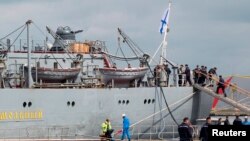President Francois Hollande won broad domestic applause on Tuesday for defying allies Britain and the United States by confirming plans to deliver a helicopter carrier to Russia. One backer dismissed their objections as hypocritical.
Speaking on the eve of a European Union meeting to discuss sanctions on Moscow over Thursday’s downing of a Malaysian passenger airliner over eastern Ukraine, Hollande said late Monday that a first Mistral warship would be handed over on schedule in October. A decision on a second would depend on Russia's attitude.
It was the clearest signal yet that Paris will go through with the controversial deal despite the Ukraine crisis. It came only hours after British Prime Minister David Cameron said it would be “unthinkable” for his country to fulfill such an order.
“Hollande is not backing down. He is delivering the first [ship] despite the fact he is being asked not to,'' Jean-Christophe Cambadelis, head of Hollande's ruling Socialist Party, told i-Tele television on Tuesday.
“This is a false debate led by hypocrites. ... When you see how many [Russian] oligarchs have sought refuge in London, David Cameron should start by cleaning up his own backyard.''
A first for France
The 1.2-billion-euro ($1.62 billion) contract for the two warships, signed by ex-president Nicolas Sarkozy's conservative government in 2011, was the first by a NATO member country to supply Russia with military equipment.
Some 400 Russian sailors arrived in France on June 30 to begin training on the first Mistral, named Vladivostok. They are being housed aboard a Russian ship docked in the western port of Saint Nazaire and have kept a low profile. They are due to stay until late September.
U.S. President Barack Obama expressed concerns about the Mistral contract in June because of Russia's annexation of Crimea and support for separatists in eastern Ukraine. A senior U.S. administration official on Monday said Washington continued to oppose the deliveries.
“Just because the Americans say 'jump,' we shouldn't jump,'' Xavier Bertrand, a former minister under Sarkozy and senior member of his conservative opposition UMP party, told France Inter radio. “France's word, its signature, must be respected.''
Consensus a challenge
The wrangling over the warships highlights the difficulties the 28-member European Union has had in agreeing a joint line on dealing with Russia, a major gas supplier to countries such as Germany and Italy, as well as to central Europe.
While pressure for tougher action has mounted following the downing of the Malaysian Airlines airliner, EU foreign ministers were not expected to deepen sanctions significantly on Tuesday.
Diplomats said it was more likely they would agree to hasten implementation of measures already agreed against Russian individuals at their meeting in Brussels.
With the French economy stagnant, unemployment stuck above 10 percent and Hollande's poll ratings at record lows, cancelling the Russian order would have dented the popularity of his Socialists around the town of Saint-Nazaire, where the shipyards have long been a major employer.
France faces financial penalties if it doesn’t deliver the ships on time.
“If these ships hadn't come along three years ago, we don't know if the company would be around today,'' Johan Jardin, a delegate for the CFDT trade union at the STX shipbuilding firm told Reuters.







